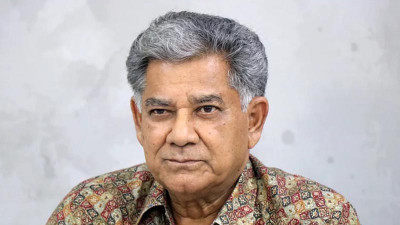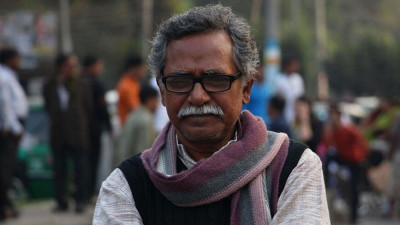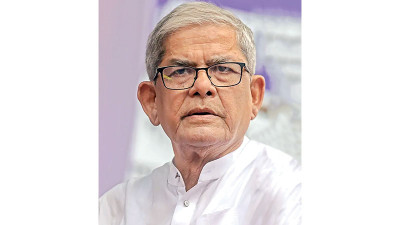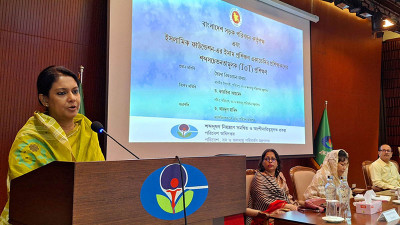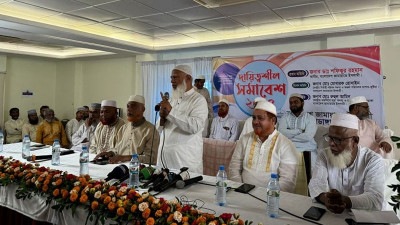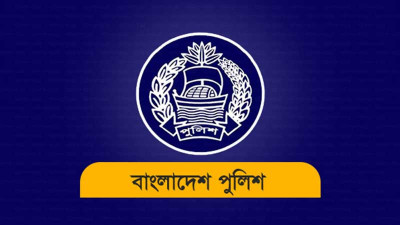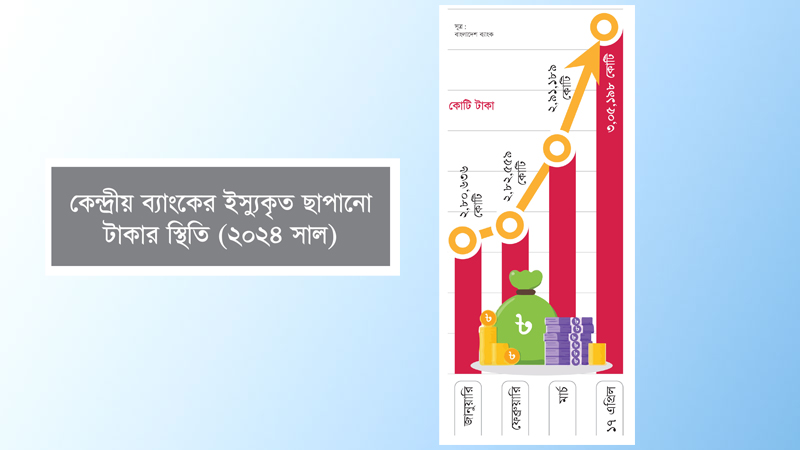 Bonik Barta graph
Bonik Barta graph Following the national election, the political situation of
the country is by and large stable. The uncertainty in relation to getting loan
from the International Monetary Fund (IMF) has subsided. The digital payment
system of the country is better than before. Yet, the pressure of withdrawing
cash money from the banks has further increased. In order to minimize the
pressure, Bangladesh Bank continues to rise the issuance of notes. This is
happening on the heels of declaring a contractionary fiscal policy at the
beginning of the year with a view to controlling high inflation. The main
objective of the declared fiscal policy was to control the money flow in the
market.
According to information available from Bangladesh Bank, the
central bank is gradually issuing notes from the beginning of the year. In
January, the volume of issued notes was Tk 2.8064 trillion. It went up to Tk 3.052
billion on April 17. This shows an increase of printed money worth Tk 245.62
billion in just three months and a half. Of the issued notes, more than Tk 2.7
trillion is out of banks.
In order to reduce the flow of money in the market, Bangladesh
Bank hiked the repo rate several times. Currently, it stands at 8.5 percent. At
the same time, the bank interest rates went up to nearly 15 percent from 9
percent. The flow of loans in the private sector is fairly stagnant. Import has
been brought down by 15.5 percent. Demand of products went down alongside
reduction of industrial production. Under such circumstance, economists believe
that swelling of issued notes is worrying. They are of the opinion that it is
indicative of people’s continued lack of confidence in the country’s banking
sector.
Officials of the central bank acknowledge that some customers
are withdrawing their deposit due to lack of confidence. But, there are many
other reasons behind the increase of volume of issued notes. Officials of the
departments concerned say that Eid-ul-Fitr was celebrated on April 11. There is
always a greater need for cash money in the marked during Ramadan and Eid. And,
owing to the devaluation of taka against dollar and high inflation, the demand
of cash has surged.
Economist Dr Ahsan H Mansur said, “The necessity of cash in
the country increases in line with corruption. The rule of black money is
rampant everywhere. So, the demand of cash is not diminishing. Influential
people, including government employees, politicians and businesspersons are
piling cash in their homes. They making transactions worth millions through
cash.”
“In the whole world, demand of cash goes away with the
financial inclusion. But, it is not happening in our country despite that fact
that financial inclusion and radius of banking sector are quite large. People
are making cashless transactions across the world. Even in neighboring India,
people are using Paytm to make small transactions. But, we do not have it here.
All the transactions in large wholesale markets take place in cash,” he said.
The 12th national election was held on January 7, this year.
In the lead up to the election, demand for cash money started going up from
October, last year. Of course, lack of confidence among customers in some of
the banks played a role in this regard. People concerned expected that cash
flow would decline after the election. But, that did not happen. Rather, it has
gone up.
With a view to controlling inflation, Bangladesh Bank
announced a contractionary monetary policy in the beginning of the current
fiscal year (July, 2023 to June, 2024). Repo rates were increased to reduce the
market cash flow. The maximum celling of the lone interest rates, 9 percent,
was removed. Since then, interest rates have kept going up. The maximum
interest rates were at 13.55 percent in April. In the current month, interest
rates on loans were totally left on the market. The interest rates on
government treasury bills are now over 12 percent. Repo rates were increased
few times to take them to 8 percent. All these initiatives of the central bank
could check the flow of cash and inflation did not come under control.
According to information from Bangladesh Bureau of Statistics,
the inflation was at 9.74 percent in April. It has been over 9 percent for past
23 months in a row albeit economists believe that the actual inflation rate is
way higher than the Bureau of Statistics proclaims.
Former Bangladesh Bank Governor Dr Salehuddin Ahmed believes
that it will not be possible to bring inflation under control with so much cash
outside of the banks. “The contractionary monetary policy Bangladesh Bank is
talking about has failed because a group of money is there sitting on large
cash. More than half of country’s economy is beyond the control of the banking
sector. In such a situation, inflation cannot be controlled by increasing
interest rates and announcing contractionary monetary policy,” he told Bonik
Barta.
“The reign of black money in the country’s economy is on the
rise. Bribery, corruption and extortion have gone up after the national
election. So, it is natural that the necessity of cash will increase,” he
added.
There is an ideal proportion regarding the presence of issued
notes in a country’s economy. The amount of cash issued by Bangladesh Bank
before 2020 was at best 12 percent of the broad money. The rate slightly increased
due to the Covid-19 pandemic. Despite that 13.42 percent of the broad money was
outside of the banks in June, 2021. The rate was limited to 13 percent in 2022.
But, in June, last year, the percentage went up to 16.52. Though it got down a
bit in December, 2023, the rate currently stands at nearly 15 percent. Economists are of the opinion that the
maximum rate can be 10 percent given the technological development.
However, Bangladesh Bank Executive Director and Spokesperson
Mezbaul Haque claimed that the amount of issued notes was increased to support
the country’s GDP growth. “Economic growth must continue even if a
contractionary monetary policy is followed. Therefore, money is being issued as
per the necessity. The deposit growth is quite good now. With the increased
repo rates, the interest rates on deposits are also going up. Therefore, people
are now getting interested to keep their money in banks. The issue is under
control albeit the amount of notes is on the rise.”
An overwhelming 92 percent of the notes printed by Bangladesh
Bank are of denominations of Tk 500 and Tk 1,000. In June, last year, the
central bank had nearly 2.36 billion notes of Tk 500 denomination valued at
approximately Tk 1.18 trillion. This was 38 percent of the issued money. There
were 1.68 billion notes of Tk 1,000 denomination with a value of Tk 1.68 trillion,
which represented over 54 percent of total notes in the market. In total, the
amount of money printed by the central bank in June, last year stood at over Tk
3.1 trillion.
Bank executives are of the view that people tend to keep the
money at home due to the easy availability of the larger notes. And, the money
received from bribery and corruption goes to vault as black money. Notes of Tk
1,000 denominations are mostly used in illegal transactions, including hundi.
Bangladesh Bank is also issuing larger notes owing to increased demand. The
situation is leading the country to a position where the shadow economy is
bigger than the main economy.
Former Association of Bankers Bangladesh Chairman and Mutual
Trust Bank Managing Director Syed Mahmubur Rahman said that larger notes are in
very high demand nowadays. “Preservation and carrying of high-value notes are
easy. As a result, people ask for notes of Tk 1,000 as they take little space
to keep them. The country has more cash than liquidity in the banking sector.
It needs to be looked at if the larger notes are playing any role in this
regard.”

